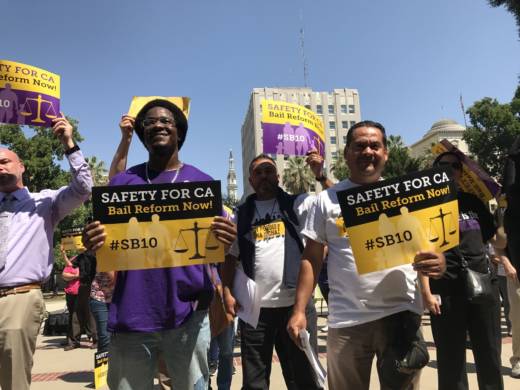SB 10 would end bail starting Oct. 1, 2019, and instruct county courts to adopt risk assessment tools that use algorithms to predict both whether criminal offenders are likely to pose a risk to public safety if they are released -- and whether they are likely to show up in court.
The bill instructs courts to release nearly all misdemeanor defendants after they are booked. Offenders deemed low and medium risk could also be released, with conditions like probation supervision or an ankle monitor if a judge thinks that's necessary.
People deemed high risk -- including those facing violent felony charges and those with past violent felonies -- would generally be held in jail until their trial.
Oakland Assemblyman Rob Bonta, who has helped shepherd the legislation, said the bill would represent a huge step forward. He said that it would end a system that both discriminates against the poor and allows people who are actually dangerous to buy their freedom.
"We have an opportunity today to seize the moment and do something that will make California safer, that will make California more fair, that will make California more just," he said.
But Abdi Soltani, executive director of the ACLU of Northern California, said the bill will result in more people being detained before their trials -- and expand all the problems that come with that.
"You know we are innocent until proven guilty, and simply being arrested and charged does not constitute guilt," he said. "When a person is detained in jail awaiting trial -- even for a few days -- they can lose their home, their job, the custody of their children. And that can lead them to plead guilty when they're innocent."
Many Republican lawmakers also spoke out against SB 10, arguing that it has been rushed through the process and will put an entire industry out of business.
But powerful law enforcement groups -- including those that represent sheriffs, prosecutors and police chiefs -- dropped their opposition after the changes were made and are now "neutral."
"While the bill is not perfect, and will certainly require additional fine tuning (and a significant commitment of resources), it makes an important shift towards a pretrial system that is safer and fairer than what is in place today," California District Attorneys Association lobbyist Sean Hoffman said in a written statement. "To the extent that SB 10 allows us to seek preventive detention in appropriate cases, it gives us an opportunity that we don’t currently have, and ultimately puts that decision in the hands of a judge, not just an algorithm."
Some Democratic lawmakers said the bill is just a first step. Assemblyman Reggie Jones-Sawyer, D-South Los Angeles, said the Legislature will have to revisit the issue next year.
"We are going to have to come at it again and again ... until we get the system that we want ... until we build a system that is equitable and provides justice for all," he said.
Assemblywoman Shirley Weber, D-San Diego, said she shares some of the ACLU's concerns, noting that prosecutors and judges can be influenced by racial biases. But she called the bill a giant step forward.
"I have learned over all the years of my life that change is hard, it is difficult," Weber said. "And often out of fear of change, we do nothing ... and things don't get better, they get worse. And it requires courage sometimes to step forward and not just make that change, but work to make that change right."
This post has been updated to include reaction from law enforcement groups.

